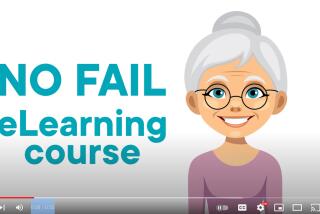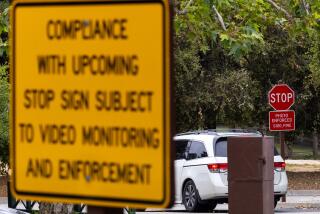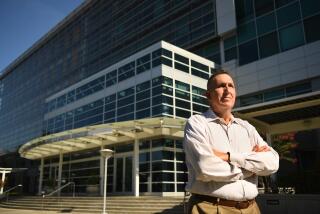Young Driver Beats Traffic Ticket With an Unusual Appeal
- Share via
SAN DIEGO — Bart Matthew Larson lived a teen-ager’s dream. He fought the law--up the legal ladder to the rung just below the state Supreme Court--and won.
Charged with speeding and ordered to attend traffic school, Larson returned to court one day late with a certificate showing he had completed the course and thus paid his debt to society.
The traffic hearing officer, however, refused to accept the document, saying Larson was a day late and would, as a consequence, find himself many dollars short. The hearing officer imposed a $166.50 fine--steep for a 17-year-old high school senior who barely scraped together the $24 he needed for traffic school.
Larson protested, firing off a handwritten letter that made its way to the 4th District Court of Appeal in San Diego.
The court treated the letter as a formal appeal from a defendant unable to afford a typewriter or a lawyer. The state attorney general’s office weighed in with an officious brief on behalf of the hearing officer. Last week, a three-judge appeals court panel unanimously reversed the hearing officer and ordered the traffic ticket dismissed.
“I kind of expected to be, I guess, screwed by the traffic system,” Larson said Tuesday. “I was really surprised, quite surprised, to see they had reversed it.”
The case had sparked quiet outrage among clerks of the 4th District Court. The clerks, who asked to remain anonymous, said they considered the action by the attorney general’s office a misuse of scarce court resources.
The 4th District Court, the busiest of six mid-level California appeals courts, is swamped with appeals ranging from murder cases to complex civil suits. It is extremely unusual for the court to consider a traffic ticket.
Judge Daniel J. Kremer, the court’s presiding judge who wrote the unanimous opinion issued Jan. 30, said he could not comment on the merits of the appeal because of an ethical rule barring judges from speaking about cases they handle.
But he said it appeared to be “one of the extreme examples of a case that should have been terminated earlier, one way or another.”
Larson was charged with going 75 m.p.h. in a 55 m.p.h. zone on Interstate 5 in San Diego on Nov. 25, 1989. He was also cited for not wearing a seat belt.
Because the ticket was Larson’s first, Frank L. DuPont, a hearing officer at the San Diego Juvenile Traffic Court, allowed him to attend traffic school in lieu of a fine. This is a common practice in such cases.
DuPont even gave Larson an extension to April 6, 1990, to return to court and prove that he had completed the course.
When Larson showed up April 7, DuPont refused to accept the school certificate and ordered the fine--sparking Larson’s appeal.
Kremer said that in the court’s opinion, reprimanding Larson would have been enough.
More to Read
Sign up for Essential California
The most important California stories and recommendations in your inbox every morning.
You may occasionally receive promotional content from the Los Angeles Times.













